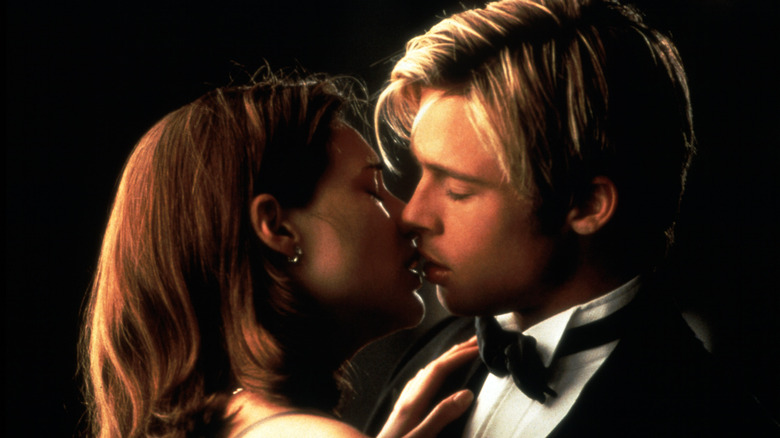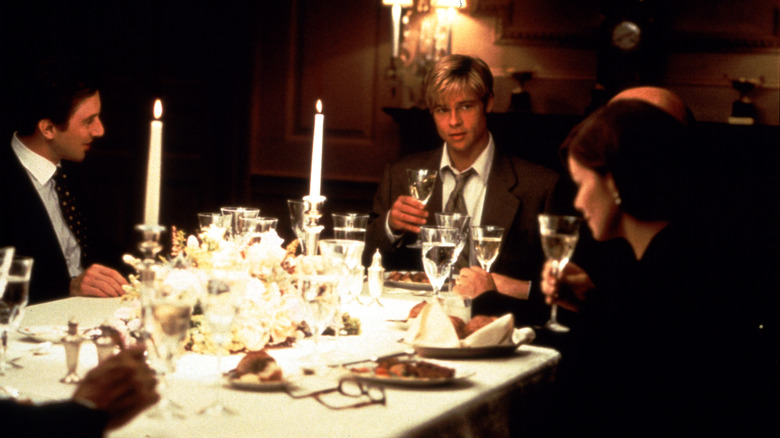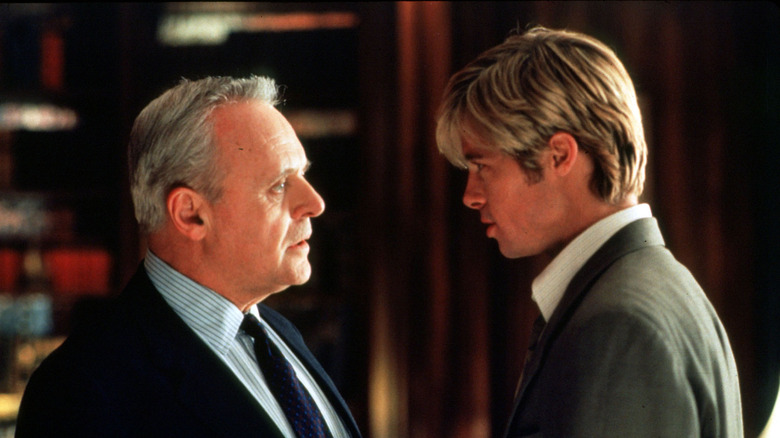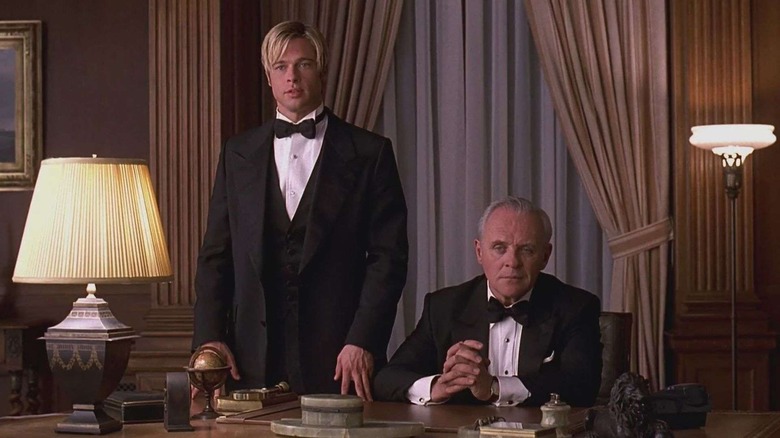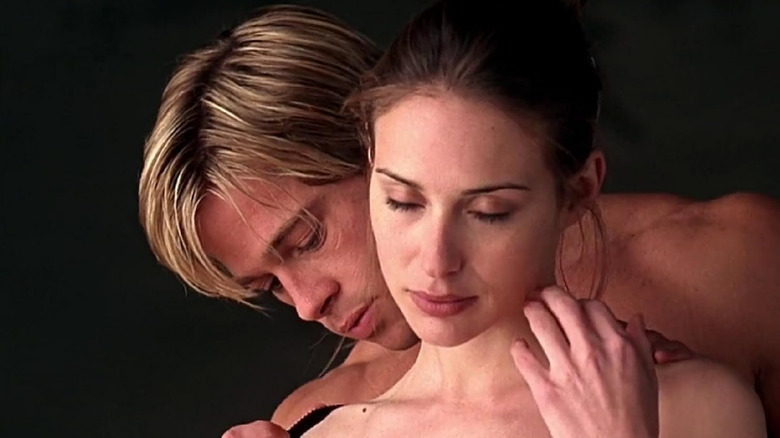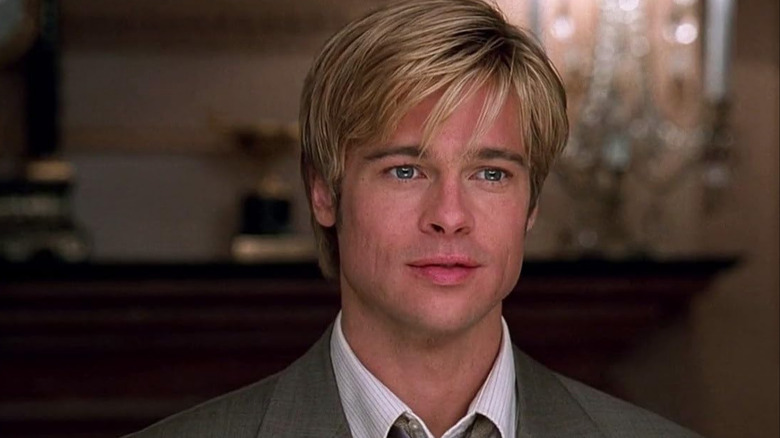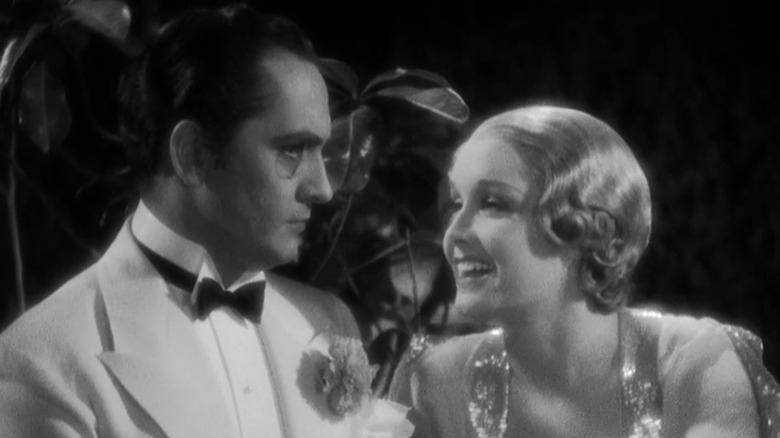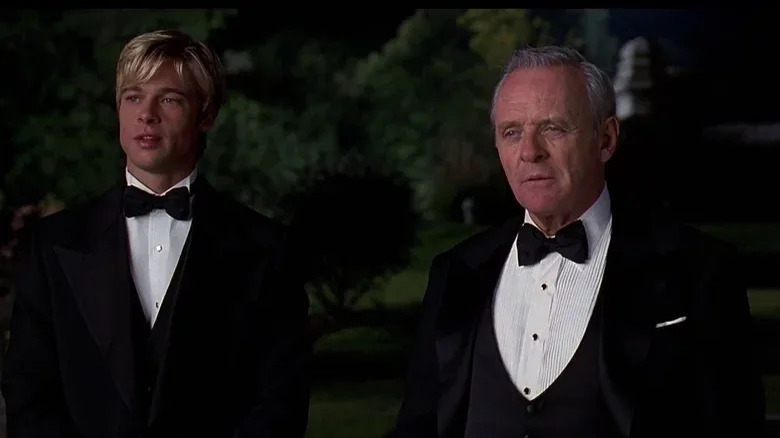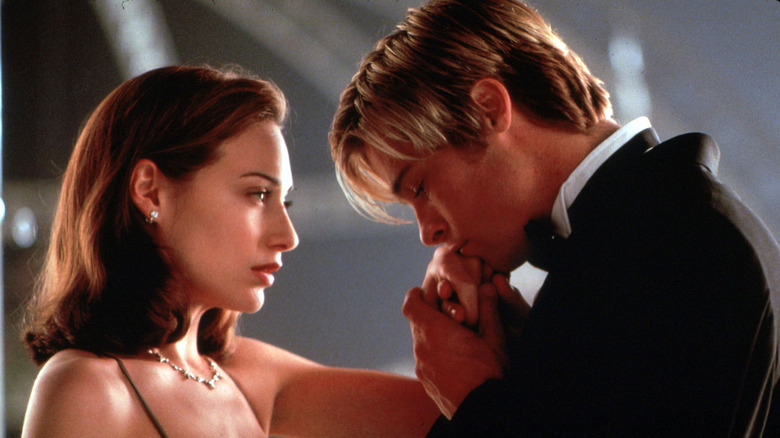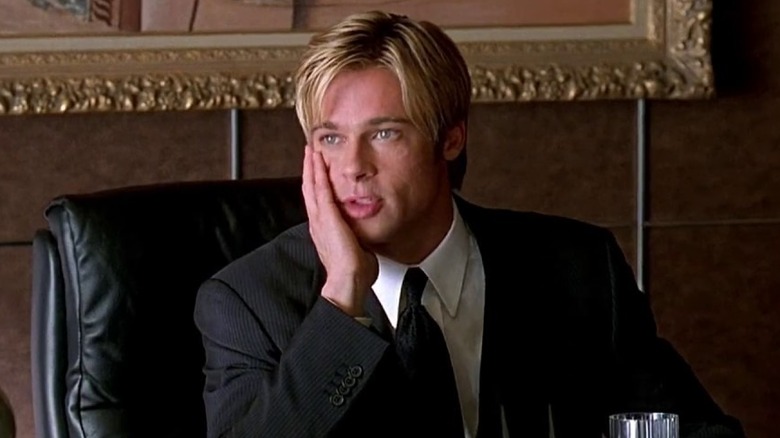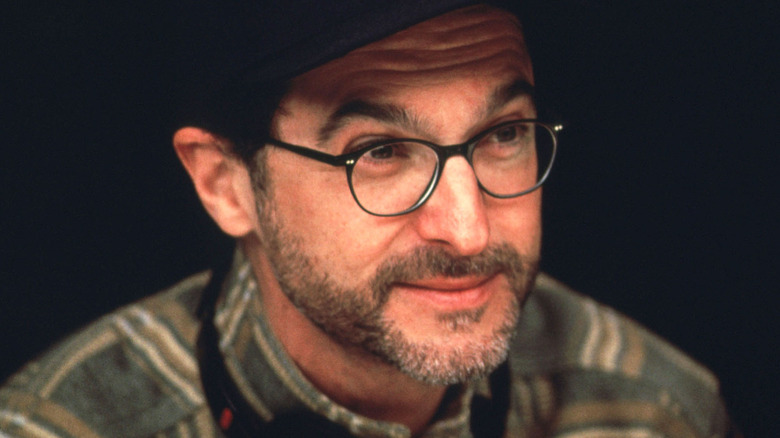The Ending Of Meet Joe Black Explained
We've all seen the viral video of Brad Pitt getting hit by multiple cars at a busy New York City intersection, but how many people know that the clip came from "Meet Joe Black"? The three-hour rumination on life, death, and peanut butter was one of the most hotly anticipated titles of 1998, and for good reason: Pitt was the most sought-after leading man of the day; director Martin Brest was fresh off the Oscar-winning hit "Scent of a Woman" (1992); and the supporting cast boasted the likes of Anthony Hopkins, Claire Forlani, and Marcia Gay Harden.
Yet reviews were tepid and audience response was muted, with much of its box office attributed to "Star Wars" fans who bought a ticket to watch the first trailer for "The Phantom Menace," only to leave before the actual movie started. People of a certain age will no doubt remember it as one of those bulky, two-cassette tape rentals from Blockbuster, even if they don't remember much about the film itself.
In the 25 years since its release, "Meet Joe Black" has become more meme than movie. Yet viewers willing to sit through its gargantuan runtime might be surprised by how much of an emotional wallop the ending packs. Anyone who hasn't seen "Meet Joe Black" yet and doesn't want it spoiled should probably stop reading, as we're about to take a deep dive into the closing passages of a story with enough characters and subplots to fill out three or four different movies.
What you need to remember about the plot of Meet Joe Black
Billionaire Bill Parish (Anthony Hopkins) awakens one morning to a voice only he can hear, softly whispering one word: "Yes." As his eldest daughter, Allison (Marcia Gay Harden), prepares a lavish celebration for his 65th birthday, Bill is on the verge of merging his media corporation with another conglomerate, spearheaded by his ruthless lieutenant, Drew (Jake Webber). Drew is engaged to Bill's youngest daughter, the young doctor Susan (Claire Forlani), but Bill has his doubts about the arrangement. He encourages his daughter to keep her options open, because, as he tells her, you never know when lightning might strike.
Lightning indeed strikes that day in a coffee shop, where Susan meets a dashing young man (Brad Pitt) who's just arrived in the city. The two flirt over a cup of joe, but the man is so distracted as they part ways that he's killed while crossing the street. Death decides to seize control of his body and use it to explore the human world. He visits Bill, who's been suffering from chest pains, and makes a deal with him: he'll delay the old man's inevitable demise if he agrees to show him around and teach him about life. Before long Death, going by the name Joe Black, is following Bill around everywhere, sitting in on his board meetings, joining him for his family dinners, and indulging in the pleasures of living, especially a spoonful of peanut butter.
Joe learns about death, taxes, and life's other inevitabilities
Joe also takes a liking to Susan, who's confused that the charming man she met at the coffee shop has turned into an oddball following her father around. He starts visiting her at the hospital where she works, and strikes up a friendship with a dying Jamaican woman (Lois Kelly Miller) who immediately clocks him as a visitor from the other side (the less said about Pitt's Jamaican accent, the better). Pretty soon Susan has ditched her fiancee and jumped into bed with this handsome, doe-eyed stranger. This angers Drew, who's already perturbed that Joe has his boss's ear.
Meanwhile, Bill has a change of heart about the merger, fearing it could jeopardize the objectivity of news media. One night at dinner, Allison's well-meaning husband, Quince (Jeffrey Tambor), who's also on the company board, asks his father-in-law if he'd like to discuss other possible mergers. Bill agrees to set up a meeting, but jokingly says the timing is up to Joe. Quince offers to let Drew in on his deal, telling him they just have to wait for Joe's approval. Drew takes this information to the board, who vote to force Bill into early retirement and follow through with the merger against his wishes. Drew later reveals his ultimate plan to Quince: merge the company, break it up, and sell its parts to the highest bidder. On the eve of his birthday (and death-day), Bill's legacy has crumbled.
What happens at the end of Meet Joe Black
On the day of his birthday party, Bill comes to terms with his impending death. What he won't abide is Joe's plans to take Susan to the afterlife with him. Joe tells him the issue isn't up for debate, and assures him that by the end of the night Susan will have passed to the other side with him. Meanwhile, Allison comes to terms with being her father's second favorite, telling him that even though he clearly loves Susan more, she never wanted for anything from him.
As the party gets underway, Quince expresses remorse for destroying Bill's company, and Joe encourages him to come clean. He does, and Bill hatches a plan to take back control of Parrish Communications. He dispatches Quince to bring Drew to the party, and convenes the board for a secret meeting via speakerphone.
When Drew arrives, Joe reveals his "true" identity, and the nature of his relationship with Bill: he's an IRS agent who recruited Bill to help him investigate dirty dealings at the company Drew has been playing double agent for (it's a nice little callback to a scene where Drew flippantly tells Joe that the only two certainties in life are death and taxes, which takes Joe by surprise). The board votes to fire Drew, stop the merger, and reinstate Bill as the boss. With his professional legacy saved, Bill turns his attention back to saving his daughter by tapping Joe's newfound humanity.
Does Susan know Joe was Death?
Having fallen in love with Joe, Susan is devastated to learn he'll soon be leaving. While dancing together at the party, she recalls something they discussed during their first encounter at the coffee shop (before Death had taken control of his body): he asked if there was anything wrong with a man wanting to take care of a woman who takes care of him, and she told him he'd have a hard time meeting a woman like that these days. Now, she tells him, he's met that woman, and she'll gladly go away with him despite knowing very little about him. Joe realizes the time has come to reveal his true identity to the love of his ... life?
Joe embraces Susan, and she says she feels as though they're lifting off. Fear grows inside her. She looks into Joe's eyes and sees someone she doesn't recognize. It's almost as if he's someone different, she tells him, and when he asks who she thinks he is, she hesitates and replies: "You're Joe." Something in her voice signals that she knows this isn't the same man from the coffee shop, although whether or not she knows who he really is isn't quite clear yet. Later, she watches Joe and Bill walk away together, and when Joe returns alone, she tells him she wishes he could have known her father. The implication is clear: Susan knows Joe was Death, and that Death has claimed her beloved dad.
Does Joe give the body back?
When you think about it, killing a poor, unsuspecting young lad is a horrible way to start your vacation, but then again Death was never known for being fair. When meeting Bill Parrish for the first time, the old man is incredulous that Death could be a kid in a suit. "I needed a body," Death tells him, whether it was the kid's time to go or not. So what happens to the guy from the coffee shop after Death decides to end his holiday? Well, it turns out that Death might have grown a bit of a conscience during his time on Earth after all.
After escorting Bill to the next life, the young man formerly known as Joe Black re-emerges, looking confused and disheveled. He finds Susan, and recognizes her as the beautiful woman he bought a cup of coffee for. The more they talk, the clearer it becomes he has no recollection of the events of the past few days. In fact, he doesn't remember anything between meeting Susan for the first time and seeing her again at the party. What he does know is that he's madly in love with this woman he's met one time, and that's good enough for her. The two lock hands and watch the fireworks explode in front of them before returning to the party, starting their real lives together. (Now the question is: what happened to Bill's body, and why didn't Susan go looking for it?)
How the endings of Meet Joe Black and Death Takes a Holiday are different
"Meet Joe Black" is a remake of the 1934 film "Death Takes a Holiday," which itself was adapted from the French play "La Morte in Vacanza." Directed by Mitchell Leisen, it follows more or less the same plot points as the remake, except it does so in a brisk 79 minutes. Fredric March plays the titular Death, who visits Earth in the guise of the dashing Prince Sirki. Death spends three days with the wealthy Duke Lambert (Guy Standing), and falls in love with the Duke's soon-to-be daughter-in-law, Grazia (Evelyn Venable). Death decides to take Grazia to the other side with him, and the Duke implores him to let the young woman live a full life.
The biggest difference structurally between "Death Takes a Holiday" and "Meet Joe Black" is the subplot about Bill's business dealings, which is completely nonexistent in the original version. The 1934 film also imagines that during the three days Death is on holiday, no one on Earth can die, whereas Joe Black claims he can walk and chew gum at the same time. But the main divergence between the two is in the ending: whereas in "Meet Joe Black" Death decides to give the body back so that Susan can remain on Earth with him, "Death Takes a Holiday" concludes with Grazia deciding to forgo the world of the living to be with her newfound love, which comes as a shock to her fiancee, Corrado (Kent Taylor).
What the ending of Meet Joe Black means
As Bill Parrish prepares for his inevitable death, he takes to the stage at his birthday party for what amounts to a farewell speech. After blowing out the single candle atop his giant cake, he reveals to the crowd what he wished for: "That you would have a life as lucky as mine, where you can wake up one morning and say, I don't want anything more." He suddenly grows quiet, and says, almost to himself, "65 years ... Don't they go by in a blink?"
After sharing a farewell dance with Susan, he goes to Joe to meet his fate, and the two watch the ensuing fireworks show. "Hard to let go, isn't it?" Bill asks Joe. "Well, that's life. What can I tell you?" As they head across the bridge, Bill asks Joe if he should be afraid of what's waiting on the other side. "Not a man like you," Joe replies.
In this handful of scenes, screenwriter Bo Goldman (the last of four credited writers on the film) sums up the thesis of "Meet Joe Black": life is short, and you'd better enjoy every second of it, because it can be over at any minute. Yet as scary as death is, it's still a part of life, and ultimately the part that makes our lives worth living. It's little wonder that Death himself would have a hard time returning to the afterlife, having enjoyed the pleasures of love, family, and, of course, peanut butter.
Another possible explanation of the ending
In the opening passages of "Meet Joe Black," Bill implores Susan not to settle for Drew, as he hears no passion in her voice when she speaks of him. From the moment she meets the handsome stranger in the coffee shop, it's clear they have a connection that could lead to love. But when he shows up at her father's home as Joe Black, Susan is confused by how radically different he's become. By the end she's fallen in love with him anyway, yet as she's saying this to Joe, it becomes apparent that she doesn't love him, but loves the man she met in the coffee shop. It's in this moment that Death realizes he must leave Susan among the living, and he promises her that she'll always have what she felt that day when they first met.
When the young man returns, Susan knows it's not the same person she's spent the past few days with, but the chemistry she felt with the man from the coffee shop has returned. "What do we do now?" she asks this man she loves without really knowing. "It'll come to us," he says. In a way, it's a metaphor for all relationships: you can never fully know a person, and perhaps you're only loving the image of them you've created in your mind. Yet for the brief time that you're alive, try to find someone you can love as fully as possible.
What did critics say about the ending?
"Meet Joe Black" was greeted with a mixed response from critics, who chastised it for its massive length and glacial pace. Even the critics who gave it a positive review had their gripes, especially about the supersized third act. "The movie's ending takes too long," wrote Roger Ebert. "There are farewells, reflections, confessions, reassurances, reconciliations, partings and surprises." Yet Ebert also found much to appreciate in the film. Ebert's TV cohost, Gene Siskel, who at the time was dying of brain cancer, was more positive in his on-air review. He was particularly moved by the film's closing message, which he summed up as, "Love intensely. And take your life seriously."
Michael O'Sullivan of The Washington Post was more negative, calling the ending "excessive" and saying that "much of director Martin Brest's so far firm rein on the proceedings is dissipated in a squishy denouement whose payoff does not fulfill the film's grand promise." Variety's Todd McCarthy wrote of the final act, "Brest seems to be trying to pull off a metaphysical slow burn, one whose cumulative impact will prove moving and profound." Yet he found the story "too contrived and wispy to support heavy emotional investment." And Owen Gleiberman, penning an ultimately positive notice in Entertainment Weekly, complained that "not enough happens to justify the somber monumentalism" which Brest "lavishes on this whimsical supernatural soap opera," adding that the film "goes on for nearly an hour too long."
What has the cast and crew said about the ending?
In a 2011 interview with Entertainment Weekly, Brad Pitt looked back on "Meet Joe Black" with a twinge of regret. "That was the pinnacle of my ... loss of direction and compass," he said. It's easy to understand why he'd feel that way, since the lion's share of critics slammed his performance as Death with frosted tips. "I dogged it," he added. "I miffed it. I shouldn't have been there in the first place."
For director Martin Brest, whose other credits include the action comedies "Midnight Run" (1988) and "Beverly Hills Cop" (1984), the film was the beginning of the end of his career as a major Hollywood filmmaker. He would direct one more movie, the critical and commercial disaster "Gigli" (2003), before leaving the business for good. Although he's spent most of the last two decades in hiding, he has emerged from time to time as of late, sitting down for a long-form interview with Variety in 2023.
He spoke fondly of "Meet Joe Black," particularly the scene where Death reveals his identity to Susan, which he considers "the most accomplished [scene] I've ever been involved with, even though it's just two people talking to each other, because there's so many components in it, and it's saying something that I would have an impossible time expressing to somebody." Brest added that the scene was "one of the reasons I wanted to do the movie," and why, despite its detractors, he's still "very proud of" it.
